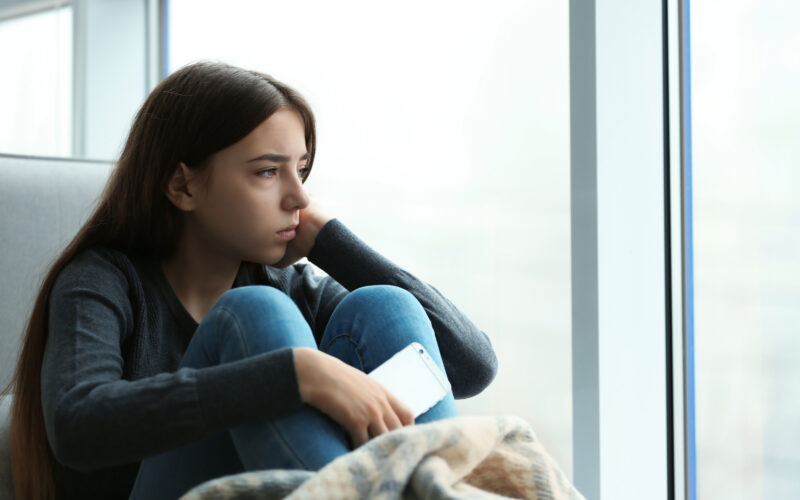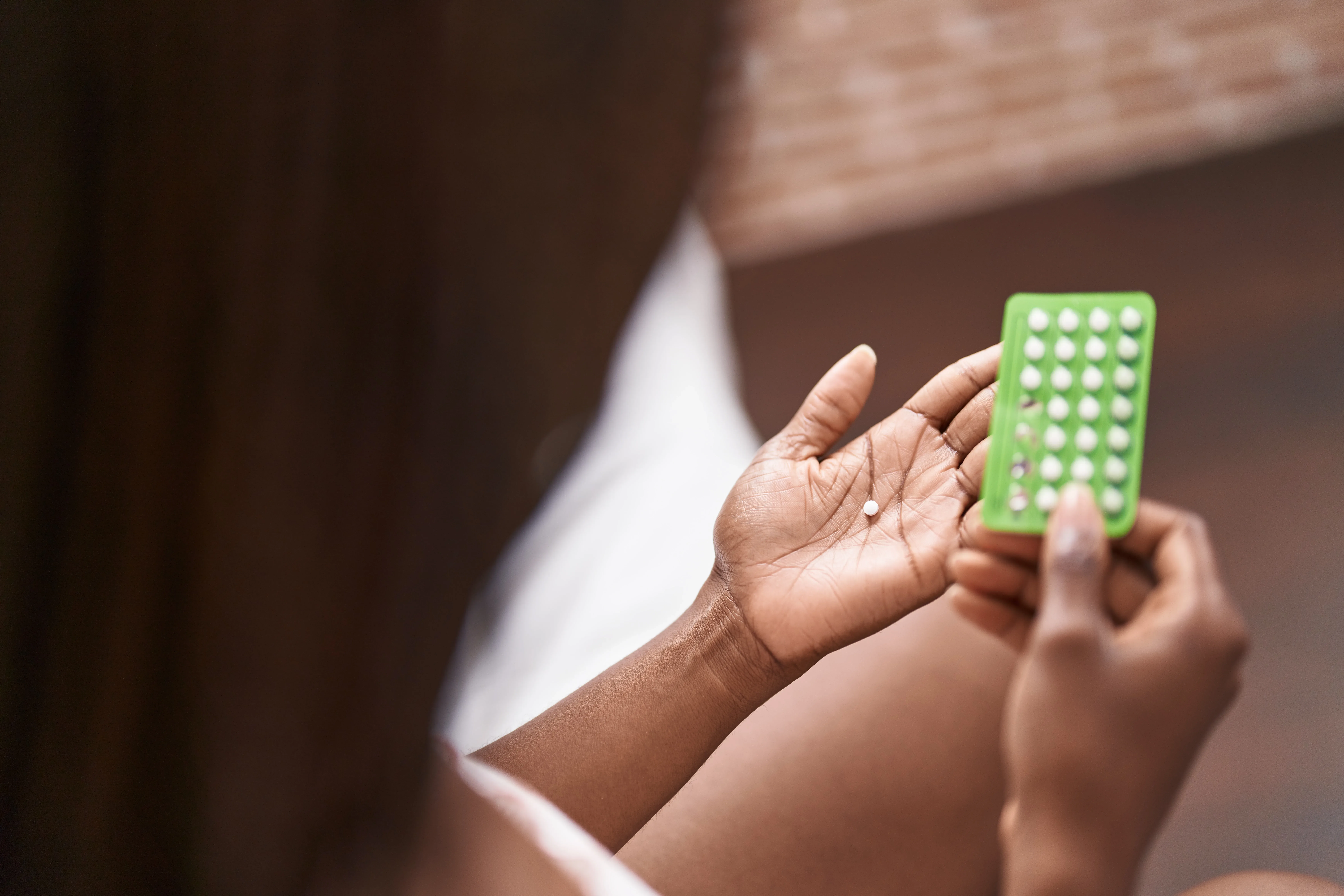You already know hormonal birth control boasts common side effects like bloating, acne, spotting, and fatigue, to name a few. But popular health websites like Healthline are typically quick to assure readers that most side effects are “mild.” Many doctors, too—and perhaps now increasingly so with the FDA approval of the over-the-counter “mini-pill”—confidently brush aside any concerns about hormonal birth control, and maintain that the obvious positive of preventing unwanted pregnancy offsets any potential risks. Even National Geographic assures readers that we need not be worried about long-term effects from the pill. This is because “there’s no evidence that the pill causes permanent changes in the body.” But is it true that long-term effects from the pill don’t exist? A new study suggests otherwise. Those who start oral contraception in their teens have a significantly higher risk of developing depression.
The study
A recently published observational study out of Uppsala University in Sweden tracked the effects of oral contraceptive (OC) use on the risk of new-onset depression [1]. This study was novel in its approach because the Uppsala researchers specifically sought to prevent “healthy user bias” from muddying the study results—more on this later.
Uppsala researchers obtained data on 264,557 women aged 37-71 years old from the UK Biobank. The UK Biobank is a huge database of genetic and health information from over half a million participants for the purpose of providing data and resources in medical research. The women’s health data was collected via questionnaires and medical records over the course of four years (from 2006-2010). As they analyzed the data, the researchers homed in on women’s responses to questions about initiation and length of OC use. The majority of participants began to take OC in the 1970s and 1980s.
The researchers also examined participants’ depression rates in one of two ways. Some women had a clinical diagnosis of depression in their medical record. Separately, over 80,000 women of the total 250,000 studied took an online mental health questionnaire. The results of this questionnaire were also studied to pick up on women who experienced depression symptoms but never sought treatment or received a clinical diagnosis.
Who wasn’t included in the study?
Many women were excluded from the researchers’ analysis due to factors that could confound the results. These included women who had given birth within one year (and were therefore at risk for postpartum depression), women who had reached menopause, women who had other psychiatric disorders, women who had a medical indication to take OC, women who did not identify as white, and women who had never taken OC.
The researchers also adjusted for other factors that could affect depression rates, such as socioeconomic status and number of births. They further adjusted for the possibility of increased depression risk due to earlier age at menarche (first period), family predisposition, and/or early sexual activity. A sibling analysis specifically addressed the concern of family predisposition, rather than OC use, as a cause for depression.
What the researchers found: an astounding rise in depression risk for new OC users
Within the first two years of OC use, women showed a 73% increased risk of developing depression unattributed to other factors. Continued use drove these numbers higher. Adult women, women over age 20, experienced a 92% risk increase. Teenagers experienced an astounding 130% increased risk of depression.
The good news is that adult women who stopped using OC eventually returned to a normal risk of depression. However, teenagers did not fare so well: researchers found that teenage girls continued to demonstrate a higher risk after discontinuation of OC into adulthood.
Why is new-onset depression risk highest for new OC users in their teens?
Why might teens who start taking OC be at higher risk for developing depression than older users? And why might their risk persist even after they stop OC? As the researchers wrote:
“It has been hypothesized that the increased risk later in life among those who used OCs during adolescence may be attributed to a greater susceptibility to gonadal hormones, including hormonal contraception, during crucial developmental periods that affect the organization of brain structures and may lead to long-lasting changes (Anderl et al., 2022, 2020; Cahill, 2018; de Wit et al., 2020)” [1].
We already know that teens need normal, healthy menstrual cycles for proper brain development. How much more damaging is it to a young, growing brain to not only prevent that cycle from happening but also to increase that brain’s susceptibility to mental health problems?
Accounting for “healthy user bias:” what sets this study apart from others that found no association between OC use and depression risk
Some will object that other studies have found no such association between OC use and depression risk [2]. In fact, some studies that examined the relationship between OC use and depression risk found no increase in the risk or even a decrease in risk. How can this be?
Allow me to point out the nuance of the Uppsala study compared to others. The authors of this particular study believe that the lack of evidence for increased depression risk with OC use in other studies could possibly stem from healthy user bias. Healthy user bias is the phenomenon in research wherein participants drop out of drug studies due to their side effects. When this happens, the participants who remain in the study are the “healthy users.” When healthy user bias isn’t properly accounted for within a study, common side effects of a medication may appear rare, or less serious than they are, because only those who do not suffer from them or experience a mild version remain in the study.
Uppsala researchers hypothesized that, in the case of oral contraceptives, the depression risk may be highest in new users, and the increased risk could decrease slowly over time. For these reasons, lumping all users together may obscure this heightened risk in new users. To mitigate this, the Uppsala study examined data from new users separately from data from current users. The researchers noted:
“Our study found higher depression rates in the first years after discontinuing OCs. This may reflect that women who get mood-related problems discontinue OC use, but are not diagnosed with depression until after cessation” [1].
Increased depression risk in OC users, especially teens, isn’t new news
The results of the Uppsala study build on other evidence that has come before it. Other studies have found that teenage users of hormonal contraceptives are as much as three times more likely to have depression as adults, that adolescent OC use increases the risk of at least one future major depressive disorder, and that use of hormonal contraception is associated with subsequent use of antidepressants, particularly in adolescents [3][4]. (Of note, in this last study, the incidence of depression was higher when adolescents used progestin-only pills, like the much-debated “mini-pill” that the FDA recently approved for over-the-counter use).
Here’s what still needs to be studied regarding depression risk and OC users
Future research shouldn’t just study healthy white women
The Uppsala University researchers identified multiple areas in need of further research. Among them is a fuller picture of depression risk amongst users of different nationalities. Most of the participants in the UK Biobank were white Europeans and in good health. Future research should give a fuller picture of risk to multiple populations, including minority women.
A different study design is needed to account for potential recall bias
The Uppsala study relied partially on self-reported medical history collected from the women themselves. Therefore, there could be some recall bias, since the researchers did not observe many of these things—such as initial OC use, for example—in real time. Different study designs are more useful for accounting for potential recall bias than others. This isn’t a critique of the Uppsala University research study design. It’s simply an acknowledgment that each type of study design has inherent strengths as well as vulnerabilities. If a randomized, controlled trial on this topic found similar results, that would bolster confidence in the conclusions of the Uppsala University observational study.
Research is needed on all kinds of hormonal birth control, not just OCs
To give a more complete picture of the effects of hormonal birth control on mental health, all types of birth control need to be studied, not just oral contraceptives. Given the timing of initial OC use for many of the women in the study, it is likely that the results are based largely on so-called second-generation OCs, which contain both synthetic progesterone (progestin) and estrogen and were prevalent in the UK during the 1970s and 1980s. However, this is not known with certainty, and further research needs to be conducted on the effects of each generation of hormonal contraception (and, ideally, on each route of administration) on a woman’s mental and physical health.
Encouragingly, one of the researchers leading the study, Therese Johansson, pledged to do just this:
“In a future study, we plan to examine different formulations and methods of administration. Our ambition in comparing different contraceptive methods is to give women even more information to help them take well-informed decisions about their contraceptive options.”
The bottom line
And that is exactly the point. Women, young and old, need more information to help them make well-informed decisions about their own bodies and health. Our teenagers need to know what’s normal for their menstrual cycle and what’s not. They need to know why their fertility is a major biomarker of their health. None of this information is available to them with birth control use. Furthermore, adolescence is a time period of heightened emotions, sudden body changes, and mystifying hormonal shifts. Let’s not add depression to the already-lengthy list of physical and emotional challenges a teenager navigates.
References:
[1]Johansson, T., Vinther Larsen, S., Bui, M., Ek, W., Karlsson, T., & Johansson, Å. (2023). Population-based cohort study of oral contraceptive use and risk of depression. Epidemiology and Psychiatric Sciences, 32, E39. doi:10.1017/S2045796023000525 [2] Lundin, C et al. “There is no association between combined oral hormonal contraceptives and depression: a Swedish register-based cohort study.” BJOG : an international journal of obstetrics and gynaecology vol. 129,6 (2022): 917-925. doi:10.1111/1471-0528.17028 [3] Anderl, Christine et al. “Association between adolescent oral contraceptive use and future major depressive disorder: a prospective cohort study.” Journal of child psychology and psychiatry, and allied disciplines vol. 63,3 (2022): 333-341. doi:10.1111/jcpp.13476 [4] Skovlund, Charlotte Wessel et al. “Association of Hormonal Contraception With Depression.” JAMA psychiatry vol. 73,11 (2016): 1154-1162. doi:10.1001/jamapsychiatry.2016.2387Additional Reading:
The link between depression and birth control
Study shows link between teen birth control use and adult depression
Woman’s depression and mental illness symptoms disappear after getting off the Pill
Should you put your teen daughter on hormonal birth control?







